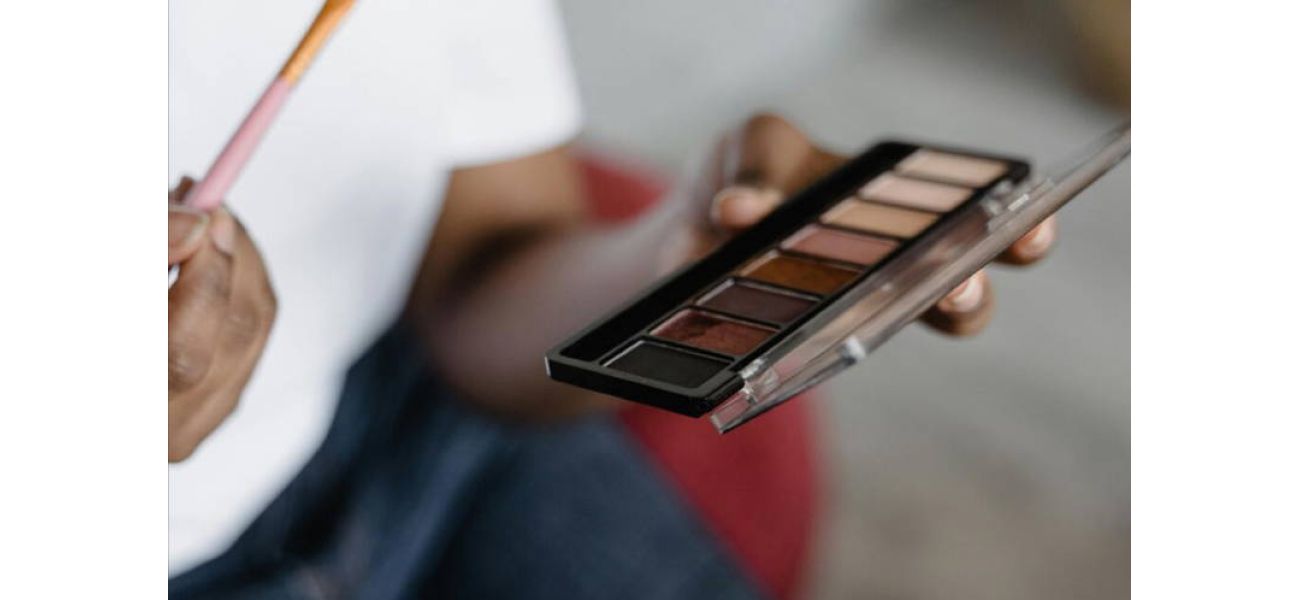Diarrha N'Diaye's journey from Ami Colé to SKIMS Beauty exposes the challenges faced by Black founders in the world of venture capital.
She was among the 30 Black women who raised over $1 million during the pandemic, giving her influence in investor meetings.
November 13th 2025.

When you search for Ami Colé on Google, you'll find out that this brand has made quite an impact in the Black beauty industry. With $1 million in financial backing, they were able to fill a void and provide much-needed products. So when the news broke that the founder, Diarrha N'Diaye, would be closing the brand and removing it from Sephora shelves in September of 2025, the beauty community was left devastated. N'Diaye's self-written piece in The Cut posed a question that echoed throughout the industry: "My beauty brand offered Black women shades they couldn't find elsewhere. Why wasn't that enough?"
But today, there's a different headline. SKIMS, Kim Kardashian's beauty venture, has announced N'Diaye as their new executive vice president of Beauty & Fragrance, starting on November 3rd. In this role, she'll be responsible for product development and brand strategy. However, before this press release, N'Diaye sat down with BLACK ENTERPRISE to discuss what really happened with Ami Colé.
The journey to securing that $1 million began in an unexpected place: therapy. Growing up in a Senegalese family where asking for money was culturally taboo, N'Diaye had to overcome psychological barriers before she could even think about pitch decks. "For me, it took a therapeutic mindset. I had to ask myself, why am I asking for money? This is not for personal gain, but for the success of the business," she explained in an interview. The breakthrough came when she changed her perspective on capital. Instead of seeing it as a handout, she viewed it as energy. "I realized that in order to bring something to life, you need a battery to power it and keep it going strong."
This shift in mindset changed how investors perceived her, as insecurity often comes with a price tag in the world of venture capital. "They can tell when you're feeling unsure about your ask or if you're asking for too little," N'Diaye shared. "I wouldn't say that it's about being deserving, but investors can take advantage of that. They may reconsider valuations or give you the shorter end of the stick."
As one of only 30 Black women to raise over $1 million during the pandemic, N'Diaye carried a lot of weight into every investor meeting. However, being part of this group didn't guarantee a lenient reception. In fact, it was quite the opposite. "It was always the elephant in the room. Investors don't like to talk about it, but there were so few solo women of color," she revealed. N'Diaye had to be quadruple prepared because venture capital operates on pattern recognition. They tend to invest in models that have already proven successful. So when you're building something entirely new, not only are you pitching a product, but you're also educating investors on why your brand's uniqueness matters.
Even with her background in research and development at Glossier, and her efforts to distinguish Ami Colé's DNA, investors still defaulted to the easiest comparison. "I really tried to change their mindset because I knew that we were not going to follow the same path as Glossier. We didn't want to be a unicorn or conform to certain metrics that didn't align with our brand's values, speed, or trajectory," N'Diaye expressed. Despite her efforts, the comparison stuck.
For many Black founders, access to friends-and-family funding rounds is not an option, which was a harsh reality for N'Diaye. She had to build her network through former colleagues, business panels, and most importantly, the Clubhouse app during its peak in the pandemic. This led to the creation of The Black Beauty Club with Tomi Talabi, where founders like Olamide Olowe of Topicals, Maeva Helene from Bread, and Abena Boamah-Acheampong from Hanahana Beauty would share their experiences. After facing 150 rejections, N'Diaye was finally able to secure the necessary funding. However, this was just the beginning of a series of tough lessons.
Landing in 250 Sephora stores may seem like a dream come true, but N'Diaye learned the hard way that without a deep understanding of the retail industry, even the most desired partnerships can become traps. Looking back, she wishes she had started with just 20 stores instead.
When you search for Ami Colé on Google, you'll discover that it was a brand that filled a much-needed gap in the Black beauty industry, thanks to its $1 million financial backing. So when it was announced on July 17 that the founder, Diarrha N'Diaye, would be shutting down the brand and pulling it off Sephora shelves by September 2025, the beauty community was devastated. N'Diaye's heartfelt piece in The Cut questioned why her brand, which offered unique shades for Black women, wasn't enough to sustain it.
But now, there's a new headline in town. SKIMS has appointed N'Diaye as their executive vice president for Beauty & Fragrance, effective November 3. In this role, she will be responsible for product development and brand strategy for Kim Kardashian's beauty venture. However, before the official announcement was made, N'Diaye sat down with BLACK ENTERPRISE to share the truth about what really happened with Ami Colé.
Interestingly, the journey to securing that million dollars started with an unexpected source - therapy. Coming from a Senegalese family where asking for money was considered taboo, N'Diaye had to overcome psychological barriers before even thinking about creating pitch decks. "For me, it took almost a therapeutic mindset to understand why I needed to ask for money. It wasn't a personal benefit or charity, but for the growth of my business," she explained in an interview. The breakthrough came when she started seeing capital as energy rather than a handout. "I realized that if I wanted to bring my vision to life, I needed a battery to power it and keep it going," she added.
This shift in mindset had a significant impact on how investors perceived her, as insecurity comes with a price tag in the world of venture capital. "Investors can sense when you're feeling unsure about your ask or if you're asking for too little," N'Diaye shared. "I wouldn't say that I deserved it, but there is a chance that they could take advantage of the situation. Things like valuations and other factors could be reconsidered, leaving you with the short end of the stick."
Being one of the only 30 Black women to raise over $1 million during the pandemic, N'Diaye was armed with statistics in every investor meeting. However, this didn't make it any easier for her, as investors tend to stick to familiar patterns and models that have worked in the past. This meant that a lot of pitches were centered around being "the Uber of XYZ" or "the Glossier of XYZ," as investors needed something they could easily understand. When you're trying to build something new and unique, you not only have to pitch your product but also educate investors on why your unfamiliarity is essential.
Despite working in research and development at Glossier and trying to set Ami Colé apart, investors still compared it to the popular brand. "I did my best to shift their mindset because I knew we couldn't follow the same path as Glossier, aiming to be a unicorn and meeting certain metrics that didn't align with our brand's intentions, pace, and rhythm," N'Diaye expressed. Unfortunately, the comparison stuck.
As a Black founder, N'Diaye didn't have access to friends and family funding rounds, which is often the case for many in the Black community. This made the stakes even higher, as she had to rely on former colleagues, business panels, and the Clubhouse app (during its peak in the pandemic) to build networks and eventually secure funding. This was the beginning of The Black Beauty Club, a platform created by N'Diaye and Tomi Talabi, where founders like Olamide Olowe of Topicals, Maeva Helene from Bread, and Abena Boamah-Acheampong from Hanahana Beauty could share their experiences and support one another. After facing 150 rejections, N'Diaye finally secured the much-needed capital. However, this was just the beginning of a series of hard lessons.
Landing a partnership with Sephora and having Ami Colé products in 250 of their stores seemed like a dream come true. But N'Diaye soon realized that without understanding the retail industry and how to scale, these partnerships could easily become traps. In hindsight, she wishes she had started with just 20 stores instead.
But today, there's a different headline. SKIMS, Kim Kardashian's beauty venture, has announced N'Diaye as their new executive vice president of Beauty & Fragrance, starting on November 3rd. In this role, she'll be responsible for product development and brand strategy. However, before this press release, N'Diaye sat down with BLACK ENTERPRISE to discuss what really happened with Ami Colé.
The journey to securing that $1 million began in an unexpected place: therapy. Growing up in a Senegalese family where asking for money was culturally taboo, N'Diaye had to overcome psychological barriers before she could even think about pitch decks. "For me, it took a therapeutic mindset. I had to ask myself, why am I asking for money? This is not for personal gain, but for the success of the business," she explained in an interview. The breakthrough came when she changed her perspective on capital. Instead of seeing it as a handout, she viewed it as energy. "I realized that in order to bring something to life, you need a battery to power it and keep it going strong."
This shift in mindset changed how investors perceived her, as insecurity often comes with a price tag in the world of venture capital. "They can tell when you're feeling unsure about your ask or if you're asking for too little," N'Diaye shared. "I wouldn't say that it's about being deserving, but investors can take advantage of that. They may reconsider valuations or give you the shorter end of the stick."
As one of only 30 Black women to raise over $1 million during the pandemic, N'Diaye carried a lot of weight into every investor meeting. However, being part of this group didn't guarantee a lenient reception. In fact, it was quite the opposite. "It was always the elephant in the room. Investors don't like to talk about it, but there were so few solo women of color," she revealed. N'Diaye had to be quadruple prepared because venture capital operates on pattern recognition. They tend to invest in models that have already proven successful. So when you're building something entirely new, not only are you pitching a product, but you're also educating investors on why your brand's uniqueness matters.
Even with her background in research and development at Glossier, and her efforts to distinguish Ami Colé's DNA, investors still defaulted to the easiest comparison. "I really tried to change their mindset because I knew that we were not going to follow the same path as Glossier. We didn't want to be a unicorn or conform to certain metrics that didn't align with our brand's values, speed, or trajectory," N'Diaye expressed. Despite her efforts, the comparison stuck.
For many Black founders, access to friends-and-family funding rounds is not an option, which was a harsh reality for N'Diaye. She had to build her network through former colleagues, business panels, and most importantly, the Clubhouse app during its peak in the pandemic. This led to the creation of The Black Beauty Club with Tomi Talabi, where founders like Olamide Olowe of Topicals, Maeva Helene from Bread, and Abena Boamah-Acheampong from Hanahana Beauty would share their experiences. After facing 150 rejections, N'Diaye was finally able to secure the necessary funding. However, this was just the beginning of a series of tough lessons.
Landing in 250 Sephora stores may seem like a dream come true, but N'Diaye learned the hard way that without a deep understanding of the retail industry, even the most desired partnerships can become traps. Looking back, she wishes she had started with just 20 stores instead.
When you search for Ami Colé on Google, you'll discover that it was a brand that filled a much-needed gap in the Black beauty industry, thanks to its $1 million financial backing. So when it was announced on July 17 that the founder, Diarrha N'Diaye, would be shutting down the brand and pulling it off Sephora shelves by September 2025, the beauty community was devastated. N'Diaye's heartfelt piece in The Cut questioned why her brand, which offered unique shades for Black women, wasn't enough to sustain it.
But now, there's a new headline in town. SKIMS has appointed N'Diaye as their executive vice president for Beauty & Fragrance, effective November 3. In this role, she will be responsible for product development and brand strategy for Kim Kardashian's beauty venture. However, before the official announcement was made, N'Diaye sat down with BLACK ENTERPRISE to share the truth about what really happened with Ami Colé.
Interestingly, the journey to securing that million dollars started with an unexpected source - therapy. Coming from a Senegalese family where asking for money was considered taboo, N'Diaye had to overcome psychological barriers before even thinking about creating pitch decks. "For me, it took almost a therapeutic mindset to understand why I needed to ask for money. It wasn't a personal benefit or charity, but for the growth of my business," she explained in an interview. The breakthrough came when she started seeing capital as energy rather than a handout. "I realized that if I wanted to bring my vision to life, I needed a battery to power it and keep it going," she added.
This shift in mindset had a significant impact on how investors perceived her, as insecurity comes with a price tag in the world of venture capital. "Investors can sense when you're feeling unsure about your ask or if you're asking for too little," N'Diaye shared. "I wouldn't say that I deserved it, but there is a chance that they could take advantage of the situation. Things like valuations and other factors could be reconsidered, leaving you with the short end of the stick."
Being one of the only 30 Black women to raise over $1 million during the pandemic, N'Diaye was armed with statistics in every investor meeting. However, this didn't make it any easier for her, as investors tend to stick to familiar patterns and models that have worked in the past. This meant that a lot of pitches were centered around being "the Uber of XYZ" or "the Glossier of XYZ," as investors needed something they could easily understand. When you're trying to build something new and unique, you not only have to pitch your product but also educate investors on why your unfamiliarity is essential.
Despite working in research and development at Glossier and trying to set Ami Colé apart, investors still compared it to the popular brand. "I did my best to shift their mindset because I knew we couldn't follow the same path as Glossier, aiming to be a unicorn and meeting certain metrics that didn't align with our brand's intentions, pace, and rhythm," N'Diaye expressed. Unfortunately, the comparison stuck.
As a Black founder, N'Diaye didn't have access to friends and family funding rounds, which is often the case for many in the Black community. This made the stakes even higher, as she had to rely on former colleagues, business panels, and the Clubhouse app (during its peak in the pandemic) to build networks and eventually secure funding. This was the beginning of The Black Beauty Club, a platform created by N'Diaye and Tomi Talabi, where founders like Olamide Olowe of Topicals, Maeva Helene from Bread, and Abena Boamah-Acheampong from Hanahana Beauty could share their experiences and support one another. After facing 150 rejections, N'Diaye finally secured the much-needed capital. However, this was just the beginning of a series of hard lessons.
Landing a partnership with Sephora and having Ami Colé products in 250 of their stores seemed like a dream come true. But N'Diaye soon realized that without understanding the retail industry and how to scale, these partnerships could easily become traps. In hindsight, she wishes she had started with just 20 stores instead.
[This article has been trending online recently and has been generated with AI. Your feed is customized.]
[Generative AI is experimental.]
0
0
Submit Comment





